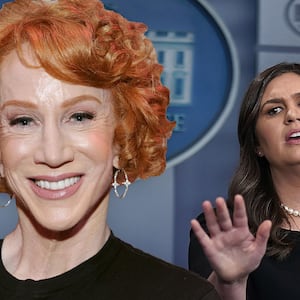“It’s so nice to not worry about spoilers right now,” comedian Matt Walsh says as we sit down for a spoiler-heavy discussion about last month’s series finale of Veep.
“I thought that was one of the more interesting episodes of television I’ve been a part of,” Walsh, who spent seven seasons playing Mike McClintock on the Emmy-winning HBO comedy tells, me on this week’s episode of The Last Laugh podcast—explaining that it was both “wonderful and crazy to see ‘24 years later’ in a script.”
That extreme time jump found Mike—who started out as communications director for Julia Louis-Dreyfus’ Vice President Selina Meyers before becoming White House press secretary when she finally became president in season four—anchoring coverage of his former boss’ funeral. He sums up her legacy for viewers by saying she is “fondly remembered for briefly freeing what was once known as the nation of Tibet as well as for permanently overturning same-sex marriage.”
ADVERTISEMENT
With Veep in the rearview mirror, Walsh is turning his attention back to the Upright Citizens Brigade, the improv institution he co-founded almost three decades ago with Amy Poehler, Matt Besser and Ian Roberts. The last weekend of June, UCB will bring its annual Del Close Marathon to Los Angeles for the first time after 20 consecutive years in New York.
“L.A. has its own charms,” Walsh notes wryly, explaining that all four of the UCB founders live in and around Hollywood now after their early days in Chicago and then later New York.
The three-day improv festival, which features dozens of live shows featuring performers like Jason Mantzoukas, Thomas Middleditch and Sasheer Zamata along with the four co-founders themselves, is named after Chicago comedy legend Del Close, who Walsh describes as the “founding father of longform improvisation.”
During the interview, we went full comedy nerd, looking back at the early days of UCB and the unexpectedly seismic influence it has had on the entertainment industry. Walsh also shared his thoughts about the abrupt departure of Sarah Huckabee Sanders from Trump’s White House and responded to the criticism UCB has received for not paying its improv performers.
Highlights from our conversation are below and you can listen to the whole thing right now by subscribing to The Last Laugh on Apple Podcasts, the Himalaya app or wherever you listen to podcasts.
On Sarah Huckabee Sanders stepping down
“When [Sean] Spicer was in there, people were like, ‘Oh yeah, he’s Mike McClintock’ and Mike was bad at his job before Spicer came around, first of all. We weren’t impersonating Spicer. But I say the same thing, which is, you have to quit your job. If you work for a terrible administration and they’re lying all the time and they’re corrupt—at some point I understand grabbing the brass ring for three months to get that job, because you’ve been kicked around D.C. But after a while, you have to quit that, otherwise you’re an awful person. So good riddance to Sarah, but you hung in there way too long. What are you doing? That’s a terrible person that you’re working for.”
On forming UCB as a rebellion against Second City
“I think Second City, when I was coming up, was the institution, so they were the thing to rebel against. Just referencing the name of the assistant mayor of Chicago in that room can get you a laugh and that’s not necessarily interesting for a young, angry person in comedy. You want to be more subversive. In truth, I think a lot of it was a bit misguided. You knew what you liked and you were trying to figure out how to do it. So we did some shows that alienated audiences because they were so aggressive and some shows that were really funny. It’s kind of judgmental, because people like—Steve Carell was on the main stage at Second City when I was in Chicago thinking I was doing better work. There was talent at Second City, but the structure was very restrictive.”
On doing comedy for the first time after 9/11
“I think we might have gone up that Thursday [at UCB]. I think Letterman might have announced he was going up Thursday and I think we were like, alright, let’s do a show. [Editor’s note: David Letterman’s Late Show actually returned the following Tuesday night.] 9/11 is an event for me where I thought the world will be forever changed, nothing will be the same. And so to see a show two days after that in our little improv theater—every scene, whatever they referenced, felt like they were talking about 9/11. You could say ‘dog’ and then you’re thinking about the dogs sniffing around the rubble to find a survivor. So it was very strange, but it was also people trying to move on in the only way they could. We don’t have any skills, we’re not going to rescue anyone, so let’s do comedy for each other at the very least.”
On criticism that UCB doesn’t pay improv performers for shows
“Why don’t [we] pay performers? I guess it’s just not our business model. The hope is that people catch a break and make a living in show business. And I guess you’re sort of networking there too. My hope for anyone who comes through there, occasionally we throw kids an industrial gig—like you can write a terrible industrial for Gillette razors and you’ll get paid $500 to write that copy. Those kinds of things are paid, but to do an improv show or a sketch show, it still has that gymnasium learning mentality. And then for people who don’t want money like Patton [Oswalt] or Sarah Silverman or Scott Aukerman, they just like the nature of the audiences that are built into that room. We try to keep the prices low and in terms of performers, I still think we treat our performers really well.”
Next week on The Last Laugh podcast: Kathy Griffin, star of the new documentary Kathy Griffin: A Hell of a Story.








